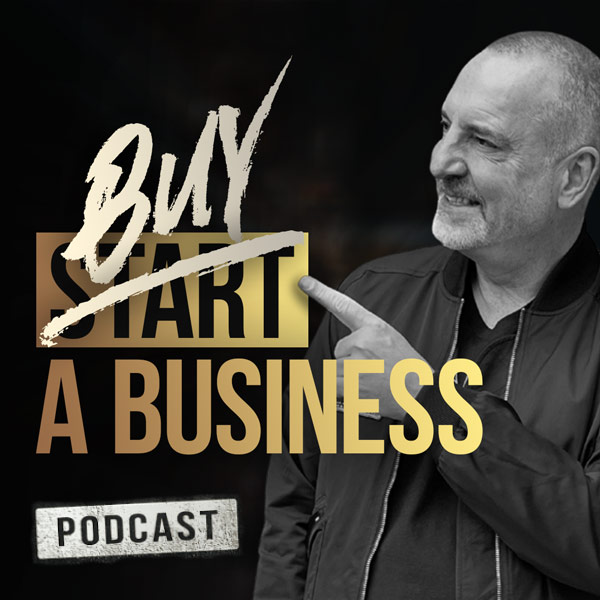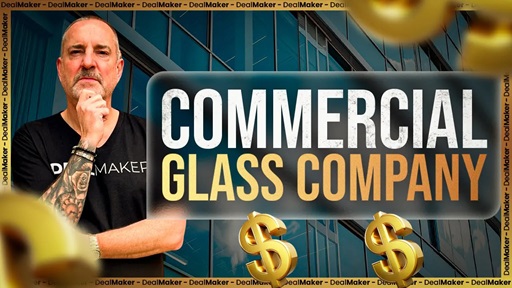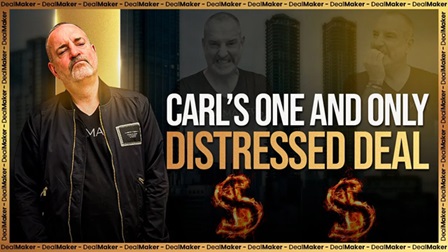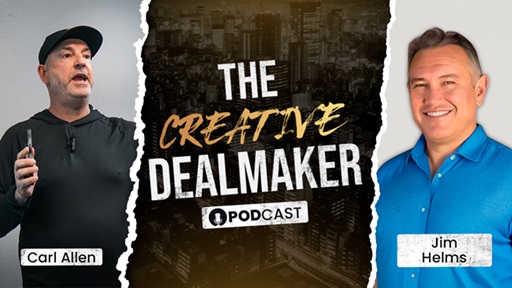The Entrepreneur’s Guide: Why Buy a Business? Pt 1
The Entrepreneur’s Guide: Why Buy a Business? Pt 1
Full Transcript:
I’ve been doing this for, over thirty years. I’ve done over four hundred deals, tens and tens of billions of dollars, Wall Street, Main Street, private equity, family office, you name it. So let’s talk about why you should buy a business. And then I’ll walk you through all the different types of acquisitions and dealmaker moves that you can make, which we’re going to go through and we’re going to teach you all of them this weekend.
So I look at business ownership like owning a car. Hands up if you own a car. Okay. Everybody owns a car, right?
Now, there’s two ways that you can own a car. You can go on eBay and you can buy the engine, the glass, the chassis, the exhaust, the wheels.
And then you can go on YouTube and figure out, you know, how the heck do I plug all this stuff together and make it work? Or do you go to a dealership and you buy a car that someone’s already built?
Right? And then what’s great about owning a car is you can buy a car without having any money. You can lease a car or finance a car. You can buy it for no money down. So that’s an analogy that’s going to run through this whole weekend. We’re going to teach you how to buy businesses without having any personal capital, how to get capital into deals that’s not necessarily your money.
So there are a lot of reasons to buy an existing business. You’ve got cash flow. It’s faster than starting from scratch. When you buy an existing business, you’re walking into cash flow on that very first day. And a lot of people that are stuck in W-2s, they’re working for other people.
They can’t go on vacation when they want. Being your own boss, having your own business has a lot of benefits. It has a lot of benefits for freedom and time and all those different things. And when you buy a company that’s been around for a long time, you can learn a lot of the different things from that business owner.
And what’s interesting is if you were to go and start a business, it’s almost impossible to raise capital. You’ve got to go to VCs. They’ll take the majority of the ownership. When you buy a business, a business is a separate legal identity to you and it has a credit.
So you’ll all have FICO scores if you’re in the US. A business has its own version of a FICO score. And if a business has got good credit, you can borrow money from a bank to finance your acquisition of that business.
Existing businesses as well have reputation. They have credibility. So one of the hardest things when you start a brand new company is no one’s heard of you. You have no track record. You’re buying a track record when you buy an existing business.
What else have we got? So I’ll show you some stats in a minute. But virtually every small business that tries to start fails. Ninety six percent of small businesses fail.
Only one in twenty five businesses survive four percent. So if you buy one of those four percent businesses, it’s like running a marathon but starting with two hundred yards to the finishing line. And all the things that you don’t have when you start a company, you don’t have any employees, any credit, any premises, any cash flow, any customers, you don’t have any of that. When you buy an existing business, you have all of those things and more.
Hands up if you own an existing business.
Okay. So if you own an existing business let’s say you had a business and you started it five years ago and you’ve just got to one million dollars in revenue. Only one in five to one in ten businesses ever get to seven figures. But you could double that business in an afternoon by acquiring another business.
If you want more assets, you can buy them. You want more customers, you can buy them. You want more employees in your business, you can buy them. You want more profits, you can buy them.
We’re going to show you this weekend, if you own a business, how you can buy everything you want and use other people’s money to do it. So I don’t want everyone in here to think, well, I can go and do one deal, and then I’ve made it. Once you’ve done it once, you can rinse and repeat and buy as many businesses as you want.
So we’re going to get to some data in a minute. But what’s really interesting is all the big companies in the world so look at Amazon. It’s a two trillion dollars company today in terms of its valuation.
And they’ve acquired over one hundred businesses in the last fifteen years. So you think when somebody ran into Bezos’ office one day and said, hey, Jeff, you know what? There’s this new technology that’s just come out. It’s called Audible.
They’re eating our lunch in the marketplace. Like, what are we going to do? Do you think Bezos got his R and D team together and said, guys, you know, we’ve got to figure out the tech stack on this. We’ve got to figure out a distribution model.
We’ve got to figure out how we differentiate. No. He just went and bought the company. When he realized a few years ago that, retail distribution of food was clearly the next big thing that’s going to move online, do you think he figured out how do I build a supermarket, build a supply chain, get suppliers?
No. He went and bought Whole Foods. So if you want to grow an existing business, you can grow it by acquisition.
We touched on the data before. What’s crazy I just I can’t understand this. It blows my mind. Every year in the United States, there are six point six million entrepreneurs will start a brand new business, according to the SBA.
Half of them will fail in one year.
Eighty percent of them will fail after the fifth year. And then by year ten, ten years in so if you started a business today in two thousand and thirty three, only four percent of the companies will have actually survived. It’s absolutely crazy. So why would you start a business? Why not go out and buy a business that’s ten years old and you’re eliminating all of that risk, all of that pain, all of that brain damage that you’re going to get by starting a company? But what’s even more staggering is today, there are over two million small businesses, sub-ten million dollars in revenues, for sale right now.
And the US is the largest market in the world for doing these deals. It’s really tough to do deals in places like China and India, which have more population. But the United States, if you take the USA, UK, Canada, Australia, which are the four key markets where a lot of our students and Protege members are doing deals, The United States really is the country with the most opportunity. But what’s crazy about all these businesses that go to market is only about one in eleven of them actually sell. Okay? And there are a lot of reasons for that.
One of the reasons is a lot of people actually don’t know how to buy a business. Right? They think if I’ve got to buy a business that’s a million bucks, I’ve got to rock up with a million dollar check to buy it. You don’t. And you’re going to learn this weekend, how to actually do that.
And what’s really interesting is a lot of people don’t realize that you can buy a business and be an owner rather than a general manager. People think, well, why do I want a business? I don’t want another job. I might as well stay where I am.
So I own seventeen companies today. I don’t work at any of them. Zero. The businesses would fail if I worked in them. I’m not an operator. I’m a visionary. So you can be an owner manager, not an owner invest so you can be an owner investor, not an owner manager, and have people run the businesses for you.
There’s a lot of pain in the market as well around business brokers. Business brokers are like Zillow. They’re like the MLS. You can go to business by sale in all these different places and see hundreds of thousands of businesses for sale.
But broker deals are not the way to be super successful as dealmakers. We can look at broker deals. Some of them are Okay. But off market deal flow is really the way to do this.
And this statistic is actually getting worse. So we’re in an unprecedented marketplace right now for buyers. This is the biggest buy side opportunity I have ever seen in my thirty one years of of doing deals. We have ten thousand baby boomers every day that are retiring in the United States. Ten thousand.
It’s crazy. And most of them have no exit strategy. Because if you go back twenty years ago, most family owned businesses, they’d just hand the business down to a son or a daughter or another family member. But now children, you know, they want to be Instagram influencers, they want to be YouTubers, or they might want to go and work on Wall Street or go to business school and do all those crazy things.
They don’t want to take over dad’s engineering company in, Boise, Idaho. They don’t want to do that, right? So you’ve got these business owners now thinking, Well, how do I sell my business? I don’t know how to do it.
I’ve got no idea how to sell a business. Ninety five percent of all the business owners you’re ever going to talk to as a deal maker once you walk away from this weekend have never been through the process before. So you’re going to be a thousand times smarter than they are because you’ve been sat inside of this room. One of the biggest things in small business ownership that blows my mind so according to the Exit Planning Institute, the average amount of retirement savings that a business owner has in a four zero one, a Roth, an IRA, whatever, is only two hundred and two thousand dollars If you’re sixty and you want to live for another twenty, twenty five years, you can’t live off two hundred and two thousand dollars Their business is their retirement pot.
So the art of deal making is simple. It’s understanding what the seller really wants, what their issues are, and building the deal around that. And what will blow your mind this weekend is, a lot of the time, it’s not about the size of the closing payment.
So the sorts of deals that we’re looking at really are in that kind of one million dollars to five million dollars sweet spot. Okay?
So the problem with going under one million dollars or even half a million in some industries is you’re really buying a job. And there’s probably not enough cash flow coming through the business for you to make money and for a general manager to go in and run that business for you. So you’re really buying a job. It’s got no middle management layer.
The owner will own all the processes in their head. They’ll control the customer relationships. You don’t want that. Once you get above half a mil or a mil, there’s middle management.
There’s SOPs. There’s KPIs. You can work on that business, not in that business. And the reason why we stick to ten million dollars you can do deals north of ten.
I’ve done them. Dealmakers in the room have done them. But really, when you go above ten mil, a lot of those businesses are easy to sell. Because if you’re a twenty five million dollars business and you want to grow by acquisition, are you going to buy twenty five million dollars one million dollars deals, or are you going to buy one twenty five dollars or ten million dollars deal?
It takes the same amount of time to do a ten million dollars deal than there’s a one million dollars deal. So there’s a job for somebody to buy up all these smaller businesses, combine them, and then you can sell them further up the food chain later.
And there are lots of reasons why business owners sell. They want to retire.
They’re done. They’re bored. They’re frustrated. They might be going through a divorce. They might have major family issues. They might want to relocate, and they can’t take the business with them.
They’re just not having fun anymore. A lot of the business owners that you talk to and we’re going to teach you all about seller psychology and how to really understand what’s going on with that business owner what you’ll realize is a lot of these issues create urgency.
And the more urgency from a seller in closing a deal, the more creative that you can be, providing that you’re building the rapport and you’re building the relationship.
Sometimes you’ll find a deal, and there might be multiple shareholders. And it’s happened to me. It’s probably happened to a lot of people that are in business. Sometimes things don’t work out.
You you fall out. You have a difference in opinion about how to take the business forward. And that can be an amazing way to get into a deal. Business owners just get bored from time to time, and they see other opportunities.
So a lot of business owners, they’ve been in for a while, and they’ve made their money. And they’re not the two hundred and two thousand dollars average retirement saver. They’ve got tons and tons of money, and they just get bored.
You can get super, super creative with doing those types of deals. Sometimes businesses are not profitable. You’ll learn this weekend why you should stay away from unprofitable businesses unless it’s a quick bolt on to an existing business that you’ve already got. And a lot of business owners, they get to a point where they just want cash out.
They want to monetize what they’ve built over time and go on to those different things. And what’s really interesting about business is if you run a business and you can’t sell it, often it can cost you money to actually close it down because you’ve got payables. You might have taxes. You might have bank loans and liens and all these different things.
So often, we can use that to negotiate the price and terms, that we want to do. And what’s crazy is sixty four percent of all the businesses that change ownership in the United States every year are business owners unable to sell, so they just literally close the doors and turn off the lights. So when we show you how to find those deals and how to build rapport and how to negotiate terms, you’re actually doing them a favor. You’re saving them from not only losing money, because it will cost them money to close the business down, but secondly, it’s their pride and their ego.
They want to go into the country club or the golf club and say to their buddies, hey, you know what? I just sold my business. They don’t need to tell them what the price was or what the terms were. But it’s an ego play.
You’re going to learn how ego is one of the key values that we tap into when we’re talking to these guys.
And I did a survey about this, several years ago. You know, I polled over two thousand business owners and said, hey, you know, why did you sell your business? What was the driver for you to make that decision? And what blew my mind is only twenty percent of it was financially related.
Eighty percent of it were for nonfinancial reasons. They wanted to sell and leave a legacy their children wouldn’t take the business on. They wanted freedom from the business. They wanted their employees to be taken care of by the new owner.
So when you’re meeting sellers and you’re having these conversations, they’re like, Wow. It’s like my knight in shining armor has come in. It’s a safe, trusted pair of hands that can take the business to the next level.




